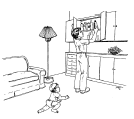Burn Prevention: Infant and Toddler

Burns can be serious injuries at any age. However, infants and toddlers are at a higher risk for burn injuries because of their innocent curiosity.
The most common causes of burns, as well as the steps you can take to prevent them from happening to your infant or toddler, are listed below.
| Causes of Burns | How to Prevent Burns |
|---|---|
|
Bathtub Scald
|
|
| Set your hot water tank temperature at 120° F (48.8°C). | |
| Always stay with your child while they are in the bathtub. Never leave them alone, not even for a second. | |
| Test bath water with your wrist or elbow before putting your child in the tub. | |
| Teach your child that the faucet is not a toy. | |
| Place your child at the end of the tub away from the faucet. | |
| Kitchen and Cooking Burns | |
| Holding an infant while you are eating, drinking or preparing hot foods is not safe. It can lead to burn injuries. | |
| Keep hot food away from your child until it cools to the right eating temperature. | |
| Keep coffee pots and cups away from the edge of tables and counters. This will help prevent spills of hot liquids. | |
| Tablecloths that hang down are dangerous to children. If you use them, tuck the edges to keep out of reach. | |
| Keep your child out of the kitchen while you prepare meals. If you cannot keep them out, create a safe place away from the stove for them to play. | |
| Turn the handles of pots and pans toward the back of the stove. | |
| Keep electrical cords to appliances, such as coffee pots, crock pots or fryers, tucked away and out of reach. | |
| Sunburn | |
| Keep your child out of direct midday sun (10:00 am to 2:00 pm). | |
| Apply a sunscreen lotion with an SPF of 30 at least half an hour before your child is out in the sun. | |
| Dress your child in a hat with a brim when he or she is out in the sun. | |
| Sunburn can occur even on cloudy days and in the shade if the child is near water. | |
| Hot infant car seat/ seat belt |
|
| Use a cloth cover on your child's car seat. | |
| Test the temperature of the seat and seat belt before putting your child in the seat. | |
| Vaporizer |
|
| Use only a cold vaporizer - not steam. | |
| Place the vaporizer on the floor or a low table. Don’t let the cord dangle. | |
| Keep all cords out of sight of children. Do not let them dangle. |
|
| Flame and Sparks |
|
| Keep lighters and matches out of the reach of children. | |
| Don’t leave burning cigarettes in ashtrays. | |
| Don’t smoke while holding a child. | |
| Keep infants and toddlers away from fireplaces, barbecue grills, kerosene heaters, and wood-burning stoves. Use fireplace screens or doors. | |
| Be sure to soak firepits with enough water to cool the coals. | |
| Touching or Falling on Hot Appliances |
|
| Keep children away from hot appliances like oven doors, space heaters, curling irons or lights. | |
| Unplug appliances when they are not in use and tuck cords away. Do not let them hang freely. | |
| Biting Electrical Cords |
|
| Keep electrical cords behind furniture. | |
| Teach your child not to play with electrical cords. | |
| Putting Metal Objects or Fingers into Electrical Outlets |
|
| Use safety outlet covers. |
|
| Keep all chemicals in a locked cabinet and out of children's reach. |
|
|
Drinking or Eating Chemicals (drain cleaner, dishwasher detergent, lye, acid, etc.)Keep all chemicals in a locked cabinet and out of children's reach.
|
|
| Keep the Poison Control Center phone number 1-800-222-1222 or 1-800-682-7625 (TDD 614-228-2272) at all phones in case of emergency. |
Treating Burns
If your child has a burn, cool the area with water for 20 minutes. Do not put ice, butter, toothpaste, eggs or anything else on the burn. It can cause a deeper burn injury. Once the area is cooled, you may apply an antibiotic ointment and loosely cover with non-stick bandage or sterile gauze roll.
If the area of the burn looks charred or is white, black or brown, which is rare, it is a very deep burn. If you child has trouble breathing get help them right away calling 911 or your local emergency number.
IMPORTANT:
If you suspect your child of playing with fire, call your local fire department. If you live within Franklin County, call the Juvenile Fire-setter Crisis Line at (614) 724-0936.
Questions? Call your local Fire Department's non-emergency number.
HH-IV-15 ©1986, Revised 2021, Nationwide Children’s Hospital


